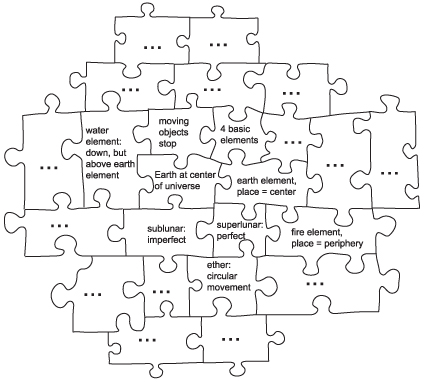The Advancement of Learning
No fact is safe from the next generation of scientists with the next generation of tools.
~Stuart Firestein
Worldviews
The year 1600 marks a turning point, according to historian and philosopher of science Richard DeWitt. It was in this year that a worldview, and its set of accompanying beliefs and ideas, died. The Aristotelian worldview, which had dominated Western Thought starting at about 300BCE, finally imploded. In its wake, a deterministic and mechanical worldview came to permeate in the minds of intellectuals, scientists, and philosophers.
Now, of course, the death of abstractions is always hard to pin down. The year 1600, more than anything, is perhaps best considered a convenient record of the hour of death. Even more evasive than determining the time of death of an abstraction may be coming to an agreement over its cause of death. Even though there is nothing analogous to, say, cardiac arrest for an abstraction, there is what we might call a natural death: some ideas simply run their course and are abandoned. This, we can say with considerable certainty, was not what happened to the Aristotelian worldview. Speaking crudely, this worldview lived past its prime and its usefulness, and so it was put down deliberately via the concerted effort of many of the most famous names in science and philosophy—Copernicus, Galileo, Descartes, Kepler, and Newton (to name a few). Its cause of death, in short, was violent.
To understand how a worldview dies, however, we should probably begin with some basics. What is a worldview, anyhow? And how do abstractions die? What was the Aristotelian worldview? What replaced it? We take these in turn.
Jigsaws
DeWitt begins his Worldviews by clarifying the notion of a worldview. He likens beliefs to a jigsaw puzzle. To have a worldview is to have a system of beliefs where the beliefs fit together in a coherent, rational way. In other words, the beliefs of our worldview should fit together like the pieces of a puzzle. We wouldn't, for example, both believe that the Earth is the center of the universe and that our solar system revolves around the center of the Milky Way galaxy. There, of course, can't be two centers. And so, at least when we are being our best rational selves, develop consistent, rational jigsaw puzzles of beliefs.
Moreover, the central pieces tend to be more important. These are what allow the rest of our beliefs to fit in or cohere with each other. Without the central pieces the outer pieces are just "floating", with no connection to the center or to each other. It may be that, as it happens to be the case with me, when you are assembling a jigsaw, sometimes you change the location of the outer pieces. You thought it went in the lower-right quadrant, but it turns out it belongs in the upper left. Analogously, less central beliefs in our worldview might be updated or even discarded, but the central beliefs are integral to the system. The central beliefs give the system meaning and form.

The Aristotelian Worldview

The Aristotelian Jigsaw
(borrowed from
DeWitt 2018: 10).
Before proceeding, it should be said that what is called the Aristotelian worldview is not exactly what Aristotle believed. Rather, it takes as a starting point several beliefs held and defended by Aristotle and grows from there. Having said that, let's take a look at some of these beliefs:
- The Earth is located at the center of the universe.
- The Earth is stationary.
- The moon, the planets, and the sun revolve around the Earth in roughly 24hr cycles.
- The region below the moon, the sublunar region, contains the four basic elements: earth, water, air, fire.
- The region above the moon, the superlunar region, contains the fifth element: ether.
- Each of the elements has an essential nature which explains their behavior.
- The essential nature of the elements is reflected in the way the elements move.
- The element earth has a tendency to move towards the center of the universe. (This explains why rocks fall down, since the Earth is the center of the universe.)
- The element of water also has a tendency to move toward the center of the universe, but this tendency is not as strong as that of earth. (This is why when you mix dirt and water, the dirt eventually sinks.)
- The element air naturally moves away from the center of the universe. (That’s why when you blow air into water, the air bubbles up.)
- Fire also tends to naturally move away from the center of the universe. (That is why fire rises.)
- Ether tends to move in circles. (This is why the planets, which are composed of ether, tend to move in circular motions around the Earth.)
Slow down there, Turbo...

I've sometimes encountered people, including people who should know better, who naively believe that people who held the Aristotelian worldview were "simple-minded" or even "stupid". I assure you, they had the same (roughly speaking) mental machinery that you and I have. In the case of Aristotle, Ptolemy, and others, I'm actually willing to wager that they were much smarter than even the average college professor. Moreover, they had what were—at the time—very good rational and empirical arguments for their beliefs. I'm sure that if you were around in those days, you would've bought into these.
DeWitt (ibid., 81-91) summarizes some arguments for the Aristotelian viewpoint from Ptolemy’s Almagest (published ca. 150 CE). For example, it was known that the Earth was spherical since objective events, like eclipses, were recorded at different times in different places, and the difference in time was proportional to the distances between locations. By studying the regularity of the sun rising in the East prior to more westerly locations, the ancients reasoned that the curvature of the Earth is more or less uniform. Having established the east-west spherical nature of Earth, which is compatible with Earth being a cylinder, he then notes that some stars are only visible the further north one goes. The same goes when traveling south. This suggests that Earth is spherical in the north-south direction too, thereby establishing that Earth is spherical.
Even though you agree (I hope) that the Earth is spherical, could you have come up with those arguments? It's important to remember that our ancestors were not naive.
It's instructive also, I think, to look at beliefs you likely don't agree with. Ptolemy gives some common-sense arguments for geocentrism: the belief that the Earth is the center of the solar system and/or the universe. Here's one such argument. The ancients knew that the Earth’s circumference was about 25,000 miles. Assuming that the Earth rotates on an axis would lead to the conclusion that a full rotation takes 24 hours. This would mean that, if we are standing at the equator, we would be spinning at over 1,000 miles per hours (since 25,000 miles / 24 hours = 1,041.7 mph). This speed would obviously be compounded by an Earth that is also orbiting around a sun. But obviously, it doesn’t even feel like we are moving at 1,000 mph, so considering greater distances is unnecessary. Heliocentrism simply doesn’t match with our everyday experience, since it doesn't at all feel like we are on a sphere travelling at well over a thousand miles per hour.
Here's another argument. Objects don’t typically move without some external force acting on them. Try it if you want to convince yourself. Earth, moreover, is a very large object. It stands to reason that only if a very massive force was moving it would Earth move. But no massive force is immediately evident. So it is reasonable to infer that Earth is stationary.
The aforementioned arguments could perhaps be dubbed "common-sense" arguments. Ptolemy also gave more empirical arguments about the nature of falling objects and stellar parallax, but these are a little more technical than what is needed to prove the basic point I want to make: the ancients were not dumb. In fact, in section 7 of the preface to Almagest, Ptolemy even briefly considers the mechanics heliocentrism(!). Also, it is noteworthy that it took the combined efforts of some of the biggest names in science, as we've already mentioned, to dethrone geocentrism. Relatedly, Ptolemy's model of the solar system was unrivaled in predictive power for 1400 years. Lastly, most educated people beginning around 400 BCE correctly believed that the Earth was spherical, as we do. In sum, the ancients were no slouches.
How do worldviews die?
Recall the analogy between worldviews and jigsaw puzzles. It is the central pieces that hold most of the import. These central pieces connect what would otherwise be disunited and seemingly unrelated components. The center is, in short, the beating heart of the worldview. Worldviews die when its central tenets are no longer believed.1


The magicians

We find ourselves in London in the year 1600. We are in the tail end of the Tudor Period (1485-1603), which is generally considered to be a "golden age" in English history. Queen Elizabeth I is on the throne as she has been since 1558, and what a reign it's been. Advancements in cartography and the study of magnetism have led to an increase in maritime trade. The British navy itself was doing very well. In the summer months of 1588, the English defeat the Spanish Armada, which had previously been thought to be invincible. There were no major famines or droughts, and there was an increase in literacy rates. It's even the case that, towards the end of Elizabeth's reign, in the early 1590's, Shakespeare's plays were beginning to hit the stage.
It was during this time period that some pivotal steps towards modern science were taken. It was a few decades earlier, in the middle of the 1500s, that there were remarkable innovations in the making and use of tools of observation, as well as ways of conceptualizing and categorizing one’s findings. Tools of observation and systematizing our beliefs (an inheritance from Aristotle), of course, are essential to science. But by 1600, one idea more than any of the others was catching in certain intellectual circles: the idea of the controlled experiment.
Prior to this time period, when one experimented, what one really meant by that was merely to say that they tried something. In fact, in some Spanish-speaking countries, the Spanish word for experiment (experimentar) is still used to mean something like, "to see what something feels like." But the word experiment was shifting in meaning. It was, in some specialized circles, starting to mean an artificial manipulation of nature; a careful controlled examination of nature. This would eventually lead to a complete paradigm shift. Lorraine Daston writes:
“Most important of these [innovations] was ‘experiment,’ whose meaning shifted from the broad and heterogeneous sense of experimentum as recipe, trial, or just common experience to a concertedly artificial manipulation, often using special instruments and designed to probe hidden causes” (Daston 2011: 82).
Who were these early experimentalists? Like all great movements, the experimentalist movement went through three stages: ridicule, discussion, adoption. Although this may pain those of us who are science enthusiasts, the early experimentalists were looked upon as... well... weird. They typically spent most of their free time engaging in experiments and would let other social and professional responsibilities lapse. They would spend an inordinate amount of their money on their examination of nature, and they would mostly socialize only with other experimentalists. Daston again:
“[O]bservation remained a way of life, not just a technique. Indeed, so demanding did this way of life become that it threatened to disrupt the observer’s other commitments to family, profession, or religion and to substitute epistolary contacts with other observers for local sociability with relatives and peers... French naturalist Louis Duhamel du Monceau depleted not only his own fortune but that of his nephews on scientific investigations. By the late seventeenth century, the dedicated scientific observer who lavished time and money on eccentric pursuits was a sufficiently distinctive persona in sophisticated cultural capitals like London or Paris to be ridiculed by satirists and lambasted by moralists” (Daston 2011: 82-3).

Stage 2: Discussion
Enter Francis Bacon (1561-1626). By 1600, Bacon had already served as a member of Parliament and had been elected a Reader, a lecturer on legal topics. But the aspect of Bacon's work that was truly novel was his approach to natural science. Bacon struggled against the traditional Aristotelian worldview as well as the mixture of natural science and the supernatural. He re-discovered the pre-Socratics and was fond of Democritus and his atomism: the view that the world is composed of indivisible fundamental components. He also had a clear preference for induction, contrary to many of his contemporaries.
In 1605, Bacon publishes The Advancement of Learning in which he rejects many Aristotelian ideas. In book II of Advancement, he argues that we must cleanse ourselves of our “idols” to engage in empirical inquiries well. These idols include intuitions rooted in our human nature (idols of the tribe), overly cherished beliefs of which we can’t be critical (idols of the cave), things we hear from others but never verify (idols of the market place), and the ideological inheritance of accepted philosophical systems (idols of the theater).
Instead, Bacon argues that the only way to know something is to be able to make it, to control it. In other words, making is knowing and knowing is making. The way this idea is most often encapsulated is in the following phrase: Knowledge is power. As it turns out, this controlling of nature overawed early experimentalists. Bacon even referred to this applied science as "magic".
Regress? What regress?
In the last lesson, we were introduced to an argument from the skeptic camp, an argument that concluded that knowledge, as conceived of by Plato, is impossible. I joked that this is more like a game to contemporary epistemic philosophers, but I wasn't completely kidding. At least some epistemic philosophers do see it that way (e.g., Williams 2004). If it is a game, then, we should be able to solve it. Bacon provides us with one possible approach: change the definition of knowledge.
Take a look once more at the regress argument:
- In order to be justified in believing something, you must have good reasons for believing it.
- Good reasons are themselves justified beliefs.
- So in order to justifiably believe something, you must believe it on the basis of an infinite amount of good reasons.
- No human can have an infinite amount of good reasons.
- Therefore, it is humanly impossible to have justified beliefs.
- But knowledge just is justified, true belief (the JTB theory of knowledge).
- Therefore, knowledge is impossible.
Notice that the word "justification" is featured prominently throughout the argument. This is important because this argument, then, is assuming Plato's JTB theory: knowledge is justified, true belief. As such, one way to diffuse this argument is to not assume Plato's JTB theory. This is precisely what Bacon is doing, and this is no accident.
Bacon rejects the Aristotelian tradition of what he calls the "anticipation of nature" (anticipatio naturae), and argues that we should instead interpret nature through the rigorous collection of facts derived from experimentation. Knowledge isn't "justified, true belief." Bacon couldn't care less whether or not his knowledge claims were justified in the eyes of Platonists. The only question for Bacon is, "Can you control nature?" If you can, that's enough to say that you know how nature works. This should be the true goal of science: to interrogate and ultimately control our natural environments and actively work towards bringing about a utopian transformation of society. Mathematicians and historian of mathematics Morris Kline puts it this way:
“Bacon criticizes the Greeks. He says that the interrogation of nature should be pursued not to delight scholars but to serve man. It is to relieve suffering, to better the mode of life, and to increase happiness. Let us put nature to use... ‘The true and lawful goal of science is to endow human life with new powers and inventions’ ” (Kline 1967: 280).
Many students find Bacon's views intuitively appealing, and they very well may be. We will put off critiquing them until the next section. For now, let me stress how this relates to our overall project.
Dilemma #1: How do we solve the regress?
So far, we've been introduced to the branch of philosophy known as epistemology, which concerns itself with questions relating to knowledge. We've seen one possible definition of knowledge (the JTB theory) and one objection to that theory (given via the regress argument) from one camp of thinkers who believe that knowledge is impossible (the skeptics). Let's flag this spot in the conversation and call it Dilemma #1. This dilemma is, in a nutshell, this: how do we stop the skeptic's regress argument?
Bacon provides us with one solution: change the definition of knowledge. In the next section, we will introduce some problems with this solution. In the lessons to come, we will look at alternate solutions coming from different theorists. Only then will we be able to judge which is the best solution.
I might add that this will be the general trajectory of the course. There will be 10 dilemmas in all, and each will be associated with a number of different solutions. These dilemmas are all interrelated, as you'll see. They are also connected to fundamental ideas in Western thought. Fun times ahead.

Bacon's legacy
Bacon's public career ended in disgrace. Although it was an accepted practice at the time, Bacon received gifts from his litigants and his political rivals used this to charge him with corruption. He was removed from public office, and he devoted the rest of his days to study and writing. He died in 1626.
His legacy lives on, however. Per Daston, “Baconians [those who subscribed to Bacon's ideas] played a key role in the rise of the terminology of observation and experiment in mid-seventeenth-century scientific circles” (Daston 2011: 83; interpolation is mine). Moreover, since the practice of science doesn’t come to fruition just from a common methodology, Bacon also suggested a way for establishing joint ground and sharing insights. In New Atlantis (published posthumously in 1626), an incomplete utopian novel, Bacon discussed the House of Salomon, a concept that influenced the formation of scientific societies, societies which still live on today. Daston again: “[T]he scientific societies of the late seventeenth and early eighteenth centuries shifted the emphasis from observation as individual self-improvement, a prominent theme in earlier humanist travel guides, to observation as a collective, coordinated effort in the service of public utility” (Daston 2011: 90).


Decoding Pragmatism
Some comments
At this point we've introduced a second contender into the fray: pragmatism. We've also complicated our epistemic picture a little bit, so I'd like to make sure everyone's on board with this:
We have two different definitions of what knowledge is: Plato's JTB theory and pragmatism.
We have two different theories for justifying knowledge claims: the correspondence theory of truth and the coherence theory of truth.
We have two different conceptions of the aims of science: realism and instrumentalism.
Lastly, these different views tend to cluster together: JTB fits in nicely with the correspondence theory of truth and realism, while pragmatism tends to fit in nicely with coherentism and instrumentalism.
Putting on our historical lenses
It may be the case that you've already picked which view you agree with. That's fine. But now I want you to think about what view would've seemed more sensible at the turn of the 17th century. If you were there at Bacon's funeral, would you have bet on his ideas catching and taking off? Would you have wanted them to?
It's hard for us to put ourselves in the right frame of mind to understand and to feel what someone from the 1600's might've thought and felt. We are, in a very real way, jaded. But we have to realize this: the great success of the natural sciences that we enjoy the fruits of today was not yet empirically validated in the 17th century. In other words, if you were there, and you were looking at these "experimentalists" and "magicians", you could reasonably argue that society should not to take the plunge. You found yourself at the crossroad. Would you choose the worldview that had dominated Western thought for over a thousand years (i.e., the devil you know) or would you take a chance with this new natural science stuff? I'm sure that we'd like to think that we would've been early adopters of the latest ideas, but consider for a moment how uncertain this new worldview must've seemed.
All in pieces...
To be honest, to only focus on the nascent scientific method is to grossly underestimate the feeling of inconstancy that was gripping society in the 1600s. It was a time of intellectual and social upheaval, sometimes violent; and it had been for a few centuries.
My guess is that most of us would have felt the same feeling of precariousness. It all felt on the verge of collapse. I close with Morris Kline's words:
“It was to be expected that the insular world of medieval Europe accustomed for centuries to one rigid, dogmatic system of thought would be shocked and aroused by the series of events we have just described. The European world was in revolt. As John Donne put it, ‘All in pieces. All coherence gone” (Kline 1967: 202).


Around the year 1600, the Aristotelian worldview, which had dominated Western Thought since roughly 300BCE, finally gave way to a new more mechanistic worldview.
During this time period, the concept of an experiment began to be developed, and experimentalists enthusiastically took to the analysis of nature.
The ideas of Francis Bacon were instrumental in standardizing and codifying the concepts of experiment, scientific societies, and eventually the scientific method itself.
Pragmatism is a competing conception of knowledge.
There are two constellations of views that fit well together:
- JTB theory + the correspondence theory of truth + realism about science
- pragmatism + coherence theory of truth + instrumentalism about science
FYI
Suggested Reading: Lorraine Daston, The Empire of Observation, 1600-1800
-
Note: The suggested reading is only the first 11 pages of the document. Here is a redacted copy of the reading.
TL;DR: 60Second Philosophy, Who is Francis Bacon?
Supplementary Material—
-
Reading: David Simpson, Internet Encyclopedia of Philosophy Entry on Francis Bacon
Related Material—
- Video: Smarthistory, Friedrich, Abbey among Oak Trees
- Note: This is an analysis of the work of Caspar David Friedrich, one of my favorite artists. I use his paintings throughout this course. One painting in particular, his Monastery Ruins in the Snow, is the image I use to represent the feeling of being trapped in the pit of skepticism.
Advanced Material—
-
Reading: Francis Bacon, Novum Organum
-
See in particular Book II.
-
-
Reading: Jürgen Klein, Stanford Encyclopedia of Philosophy Entry on Francis Bacon
Footnotes
1. DeWitt and I are both heavily influenced by the work of physicist/philosopher Thomas Kuhn (2012), as are many. This is not to say that DeWitt (or I) agree completely with Kuhn, though. Nonetheless, this whole way of speaking is reminiscent of Kuhn's The Structure of Scientific Revolutions, originally published in 1962. The interested student can find a copy of this work or watch this helpful video.

